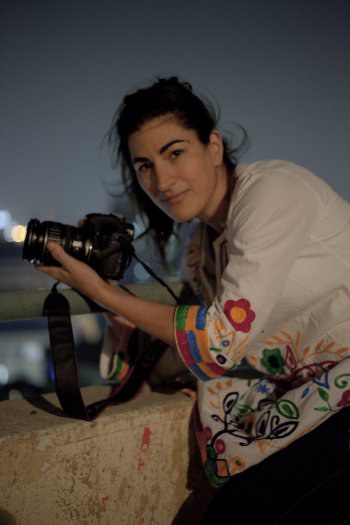An Inside View of the Egyptian Revolution

On January 25, 2011, Jehane Noujaim, the director of The Square, Academy Award nominee for Best Documentary Feature (available on Netflix), had a big decision to make. Should she go to Tahrir Square to join protestors against Hosni Mubarek’s 30-year regime, where she knew she would meet three Egyptian women activists she had followed making the film, Egypt: We Are Watching You? Or should she go to the World Economic Forum in Davos, where a lot of the country’s leadership would be? Noujaim chose the latter.
“I thought it would be interesting if the country exploded, and I was with them—it was a perspective not many people would be getting,” she said. “So I went to Davos, but, of course, none of the leadership showed up. Then I had to get back as quickly as I could.”
At the airport in Cairo, all of Noujaim’s equipment was taken—except her Canon DLR, which the people who searched her took to be a still camera. Twenty minutes after leaving the airport, Noujaim was arrested because military intelligence had searched the car and found copies of Egypt: We Are Watching You.
“Not a great title for them to find when the country is exploding,” she said. “I was taken in for about eight hours of questioning.”
Noujaim had no idea who the men in plain clothes questioning her were and didn’t plan to tell them anything, but she finally decided she didn’t want fear to dictate her actions—something like what happened with all the people who went down to the Square, she thinks.
“I said, ‘Look, I don’t know who you are, I don’t know where I am, I don’t know how long this will go on for, but you have me completely scared,’” she recalled. “‘I have made a political film about three women in Egypt who I consider heroines, and I think it’s a nationalistic movie.’”
When the interrogators let Noujaim go, she went directly to Tahrir Square. The daughter of an Egyptian father and an American mother, she grew up ten minutes from the site of the huge protests that kicked off Arab Spring.
“I found men, women, all different classes, all kind of planning the future of the country. There was this incredible energy,” she said. “When I experience something like that, I just want to share it with the world. In order to make a film to share with the world, you need characters, and in the next two weeks, I met all the characters and the crew.”
Setting up a tent in Tahrir, she found the people she follows in the documentary to tell the story of Mubarek stepping down in 2011, and then Mohammed Morsi being deposed in 2013: Magdy Ashour, a Muslim Brotherhood member and father undergoing a crisis of faith; Ahmed Hassan, a young working-class man who draws people to him; and Khalid Abdalla, a British-Egyptian actor (The Kite Runner, United 93) who left London to join the revolution.
Noujaim initially followed a few others. One of them, Dina, a student, disappeared and didn’t answer her cell phone. Noujaim and the crew worried she had been arrested, but they found out later her parents had stopped allowing her to go to Tahrir.
“After the March clearing, it was quite brutal,” Noujaim said. “Women were being arrested and virginity tests were being performed on them, and parents were legitimately concerned about their daughters.”
They had an office nearby—along with a friend’s apartment they could go to, Noujaim says, but there were still plenty of scary moments.
“If you had told me five years ago I would be running through tear gas and bullets and away from police and Army, I would have said, ‘No way,’” Noujaim said. “But there’s something that happens when you see people willing to put everything on the line. It gave me a reserve of power and strength. You somehow feel like there’s nothing more important than what you’re doing at that time, and you can’t let fear stand in the way.”
Along with Egypt: We Are Watching You, Noujaim’s other films include Control Room, about the television network Al Jazeera, and Rafea: Solar Mama, about a Jordanian woman training as a solar engineer in India. Noujaim is a huge believer in the power of film and images; when she won a $100,000 TED prize for one world-changing wish, used it for Pangea Day—for people around the globe sharing stories and experiences on film. Because of this belief that storytelling creates change, Noujaim and her crew trained others to make media.
“Here in the States, you have your heroes, like Rosa Parks who refused to sit in the back of the bus, and this is very important for kids to look to and realize that as individuals they can make change,” she said. “Something important to me was how do you empower Egyptians to make films about local heroes and get those stories out there? Coming from a culture whose stories have often been told by the West, I think it’s crucially important that this story about the Egyptian revolution is told by Egyptians.”
It’s also important to realize that change isn’t easy, Noujaim says—it can be boring and lonely and frustrating. She says some of the most exciting screenings have been in high schools and colleges, where young women came up to her and told her they were inspired to make change.
“You have to continue fighting for your rights because rights are never given to you—you’re always taking them,” Noujaim said. “In the Square I really saw with my own eyes that quote by Margaret Mead: ‘Never doubt that a small group of thoughtful, committed citizens can change the world; indeed, it’s the only thing that ever has.’”



























